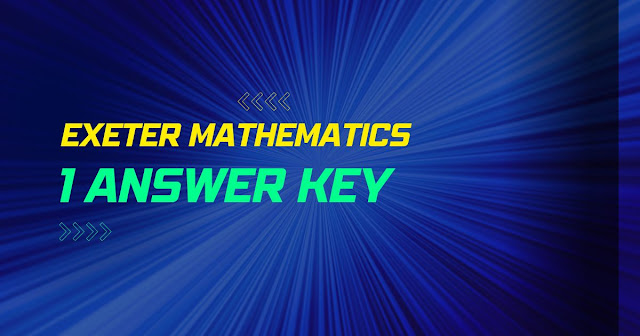Introduction Exeter Mathematics 1 Answer Key
Secrets of Exeter Mathematics 1: A Comprehensive Answer Key Guide, Exeter Mathematics 1 is a renowned and challenging mathematics curriculum that has been used by countless students to deepen their mathematical understanding and problem-solving skills. This program, developed by Phillips Exeter Academy, aims to foster a deep appreciation for mathematics and cultivate critical thinking. To navigate this challenging course successfully, students often rely on answer keys as essential tools. In this article, we will explore the significance of Exeter Mathematics 1 answer keys, their role in the learning process, and how they contribute to the overall educational experience.
Understanding Exeter Mathematics 1
Exeter Mathematics 1 is not your typical high school math course. It is a comprehensive curriculum that covers a wide range of mathematical topics, from algebra and geometry to advanced calculus and number theory. This curriculum is renowned for its depth, rigor, and emphasis on problem-solving. Students who undertake Exeter Mathematics 1 are often pushed to think critically, analyze complex problems, and develop creative solutions.
The Role of Answer Keys
In any educational setting, answer keys serve as valuable resources for students and educators alike. They provide solutions to exercises and problems, helping students gauge their understanding of the material and identify areas where they may need additional practice or clarification. Answer keys are an integral part of the learning process for several reasons:
Self-assessment: Answer keys allow students to independently assess their work. After completing exercises or assignments, students can check their answers against the key to determine if they have solved problems correctly. This self-assessment helps them gain confidence in their abilities and identify areas of improvement.
Immediate Feedback: Answer keys provide immediate feedback, which is crucial for effective learning. Waiting for a teacher to review assignments and provide feedback can be time-consuming. With an answer key, students can quickly identify errors and misconceptions, enabling them to correct their mistakes and reinforce their understanding promptly.
Learning from Mistakes: Answer keys not only reveal correct answers but also highlight common errors and misconceptions. By reviewing their mistakes, students can gain a deeper understanding of the underlying concepts and avoid repeating similar errors in the future.
Independent Study: Exeter Mathematics 1 is often used by self-motivated students seeking to challenge themselves beyond the standard curriculum. Answer keys empower these students to study independently and work through problems at their own pace, making the program accessible to a broader audience.
The Structure of Exeter Mathematics 1 Answer Keys
Answer keys for Exeter Mathematics 1 are typically organized to match the structure of the curriculum. They are available for various levels, including algebra, geometry, precalculus, and calculus. Each answer key typically consists of the following components:
Problem Sets: The answer key is divided into problem sets, each corresponding to a specific topic or chapter in the curriculum. This organization makes it easy for students to find solutions to exercises related to the material they are currently studying.
Detailed Solutions: For each problem in a problem set, the answer key provides a detailed solution. These solutions are often step-by-step, explaining the thought process and mathematical techniques required to arrive at the correct answer. This level of detail is invaluable for students striving to understand the underlying concepts.
Additional Notes: Some answer keys include additional notes, tips, or insights that further clarify the material. These notes can be particularly helpful in demystifying complex concepts or providing alternative approaches to problem-solving.
Appendices: Answer keys may include appendices that contain supplementary information, such as tables, formulas, or explanations of key mathematical concepts. These resources enhance the overall educational experience.
The Educational Value of Answer Keys
While answer keys are essential tools for students, their educational value extends beyond the immediate assistance they provide. Here are some ways in which answer keys contribute to the overall educational experience of Exeter Mathematics 1:
Promoting Independence: Exeter Mathematics 1 encourages students to take ownership of their learning. Answer keys support this goal by enabling students to work independently, reinforcing their self-discipline and problem-solving skills.
Building Confidence: As students consistently check their answers against the key and see improvements in their performance, they develop a sense of accomplishment and confidence in their mathematical abilities. This boost in confidence can extend to other areas of their academic and personal lives.
Facilitating Discussion: In a classroom setting, teachers can use answer keys as discussion starters. By reviewing problems together and comparing their solutions to the answer key, students and educators can engage in meaningful discussions about different approaches to problem-solving and mathematical concepts.
Encouraging Exploration: Answer keys can inspire students to explore advanced topics and tackle challenging problems. Knowing that they have access to solutions gives students the confidence to venture beyond their comfort zones and explore the depths of mathematics.
Fostering Critical Thinking: Analyzing solutions in answer keys encourages critical thinking. Students are prompted to question why a particular approach was taken, whether alternative methods could yield the same result, and how the solution ties into the broader mathematical framework.
Conclusion
Exeter Mathematics 1 answer keys are indispensable tools for students embarking on the journey of mastering this rigorous and rewarding curriculum. They serve as guides, offering clarity, feedback, and the opportunity for independent exploration. The ability to self-assess and learn from mistakes is a vital aspect of mathematical growth, and answer keys play a pivotal role in this process.
While answer keys are valuable resources, it's essential for students to strike a balance between using them for assistance and tackling problems without immediate reference. Ultimately, the journey through Exeter Mathematics 1 is not solely about reaching the correct answers but also about the intellectual growth, problem-solving skills, and mathematical understanding that students cultivate along the way. Answer keys are there to support and enhance this transformative educational experience.


Post a Comment